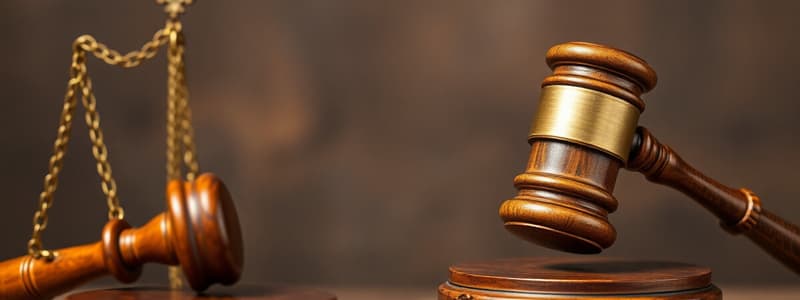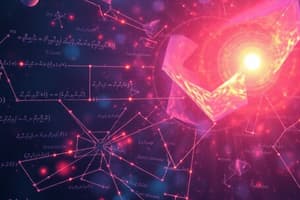Podcast
Questions and Answers
What characterizes an arbitrary law according to the description provided?
What characterizes an arbitrary law according to the description provided?
- It violates the rights recognized by the constitution. (correct)
- It is enacted by federal authorities exclusively.
- It upholds constitutional guarantees.
- It is a law that applies uniformly across all cases.
What is the primary responsibility of judges in regard to arbitrary laws?
What is the primary responsibility of judges in regard to arbitrary laws?
- To create new laws that align with public opinion.
- To examine laws for constitutional compliance on a case-by-case basis. (correct)
- To enforce all laws as they are presented to them.
- To apply the laws as stipulated by legislative authorities.
What happens when a judge declares a law unconstitutional in a specific case?
What happens when a judge declares a law unconstitutional in a specific case?
- The law becomes invalid in all jurisdictions.
- The law cannot be contested in any future cases.
- The law remains applicable until the Supreme Court intervenes.
- The decision affects only the specific case at hand. (correct)
What role does the Supreme Court play in relation to laws and their constitutionality?
What role does the Supreme Court play in relation to laws and their constitutionality?
Which statement accurately describes the judiciary's role in dealing with government actions?
Which statement accurately describes the judiciary's role in dealing with government actions?
What is the primary function of government as described in the context of a state?
What is the primary function of government as described in the context of a state?
According to the definition provided, how does the government relate to the existence of societies such as families or municipalities?
According to the definition provided, how does the government relate to the existence of societies such as families or municipalities?
How does the organization of a government vary according to nations?
How does the organization of a government vary according to nations?
What does the Preamble to the National Constitution signify regarding the government's purposes?
What does the Preamble to the National Constitution signify regarding the government's purposes?
What does Article 1 of the National Constitution of Argentina state regarding the form of government?
What does Article 1 of the National Constitution of Argentina state regarding the form of government?
What is the primary function of a political constitution?
What is the primary function of a political constitution?
Which part of the Argentine Constitution is referred to as the 'doctrinal part'?
Which part of the Argentine Constitution is referred to as the 'doctrinal part'?
What aspect of the Argentine Constitution emphasizes the importance of the federal character?
What aspect of the Argentine Constitution emphasizes the importance of the federal character?
What must be considered when a constitution is deemed suitable for a country's needs?
What must be considered when a constitution is deemed suitable for a country's needs?
What is a characteristic of a flexible constitution?
What is a characteristic of a flexible constitution?
Which of the following accurately describes the second part of the Argentine Constitution?
Which of the following accurately describes the second part of the Argentine Constitution?
What is a consequence of a constitution that lacks stability?
What is a consequence of a constitution that lacks stability?
What is the primary goal of the 'Declarations, Rights and Guarantees' section in a constitution?
What is the primary goal of the 'Declarations, Rights and Guarantees' section in a constitution?
What is the primary responsibility of provincial governors in relation to constitutional supremacy?
What is the primary responsibility of provincial governors in relation to constitutional supremacy?
Which statement accurately reflects the status of international treaties after they are approved by the national congress?
Which statement accurately reflects the status of international treaties after they are approved by the national congress?
What can render the principle of constitutional supremacy impractical?
What can render the principle of constitutional supremacy impractical?
What is one role of international treaties according to the principles of constitutional supremacy?
What is one role of international treaties according to the principles of constitutional supremacy?
Which of the following international documents is mentioned as an example of treaties that align with constitutional supremacy?
Which of the following international documents is mentioned as an example of treaties that align with constitutional supremacy?
What is the primary mechanism through which the citizens participate in their government?
What is the primary mechanism through which the citizens participate in their government?
How does the federation differ from a confederation according to the described government system?
How does the federation differ from a confederation according to the described government system?
In this government's structure, what is the ultimate source of sovereignty?
In this government's structure, what is the ultimate source of sovereignty?
What role does the constitution play in this government system?
What role does the constitution play in this government system?
Which of the following best describes the relationship between the national government and provincial governments in a federal system?
Which of the following best describes the relationship between the national government and provincial governments in a federal system?
What is one of the key functions of the legislative branch?
What is one of the key functions of the legislative branch?
Which mechanism allows the judicial branch to oversee the actions of the legislative and executive branches?
Which mechanism allows the judicial branch to oversee the actions of the legislative and executive branches?
What is the intended outcome of the separation of powers system?
What is the intended outcome of the separation of powers system?
What is the significance of extraordinary powers in the context of the executive branch?
What is the significance of extraordinary powers in the context of the executive branch?
How does the system ensure checks and balances between the branches?
How does the system ensure checks and balances between the branches?
What is the primary characteristic of a republic according to the definition provided?
What is the primary characteristic of a republic according to the definition provided?
Which principle ensures that no single entity holds excessive power in a republic?
Which principle ensures that no single entity holds excessive power in a republic?
What does the periodicity of functions in a republic aim to prevent?
What does the periodicity of functions in a republic aim to prevent?
Why is public knowledge of government actions important in a republic?
Why is public knowledge of government actions important in a republic?
What responsibility do officials have in a republic?
What responsibility do officials have in a republic?
The existence of which three powers ensures freedom and justice in a republic?
The existence of which three powers ensures freedom and justice in a republic?
Which of the following reflects the concept of popular sovereignty in a republic?
Which of the following reflects the concept of popular sovereignty in a republic?
What is a key exception to the periodicity of functions in a republic?
What is a key exception to the periodicity of functions in a republic?
What is required for Congress to declare the necessity for a constitutional reform in Argentina?
What is required for Congress to declare the necessity for a constitutional reform in Argentina?
Which organ is responsible for enacting and amending ordinary laws in Argentina?
Which organ is responsible for enacting and amending ordinary laws in Argentina?
What is the primary role of the Constituent Convention once it is convened?
What is the primary role of the Constituent Convention once it is convened?
According to the hierarchical structure established in Argentine law, which is the highest legal authority?
According to the hierarchical structure established in Argentine law, which is the highest legal authority?
What must the law passed by Congress indicate for a constitutional reform?
What must the law passed by Congress indicate for a constitutional reform?
What does Article 31 of the Argentine Constitution state regarding the concept of supremacy?
What does Article 31 of the Argentine Constitution state regarding the concept of supremacy?
In the context of the Argentine Constitution, which statement best describes the relationship between municipal ordinances and provincial laws?
In the context of the Argentine Constitution, which statement best describes the relationship between municipal ordinances and provincial laws?
What aspect of constitutional reform does the procedure specifically require in Argentina?
What aspect of constitutional reform does the procedure specifically require in Argentina?
Study Notes
Arbitrary Laws
- Arbitrary laws disregard constitutional rights and guarantees.
- Individuals must have recourse to defend their rights against arbitrary laws.
Judicial Role
- Judges are responsible for ensuring laws align with constitutional principles.
- Judges cannot apply laws deemed unconstitutional.
- This applies to government actions as well.
- A judge can declare a law unconstitutional in a specific case, but this does not invalidate the law nationwide.
Supreme Court's Role
- The Supreme Court has the final say on the constitutionality of laws.
- This is determined through an extraordinary appeals process.
- The Supreme Court's interpretation of the constitution is definitive.
Political Constitution and National Sovereignty
- The political constitution establishes the State's organization, governmental form, power limitations, and citizen-authority relationships.
- Constitutions contain rights/duties of citizens and government organization.
- The Argentine Constitution reflects national sovereignty, meaning the people, through their representatives, enact and validate the constitution.
Argentine Constitution: Doctrinal and Organizational Parts
- The "Declarations, Rights and Guarantees" section emphasizes protecting citizens' rights.
- The second part, focusing on government organization, defines the federal government's structure and functions, including provincial governments.
Provincial Autonomy
- Argentina has a federal system where provinces predate the national state.
- This historical and political truth emphasizes the federal structure, requiring reevaluation to restore provincial autonomy, particularly in economic areas.
Constitutional Reform
- Stable constitutions are essential to avoid frequent modifications.
- Flexibility refers to the ability of the same legislative body to reform the constitution, blurring the lines between legislative and constituent powers.
Federal Government
- A legally organized nation becomes a State requiring a governmental body for authority.
- The government creates rules for social conduct, aiming for the common good.
- The government maintains order and guarantees the existence of smaller communities (families, municipalities, etc.).
- The State is the dominant institution, exercising power and law, controlling, organizing, and authorizing.
- Government structures differ based on national context and traditions.
Argentine Government Form
- Argentina adopted a Representative, Federal, and Republican form of government.
Constitutional Supremacy
- Constitutional supremacy applies to all authorities, including national and provincial governments.
- Provincial governors must ensure the Constitution's adherence in their jurisdictions.
- The Constitution is the fundamental law, forming the basis of the state's legal framework.
International Treaties
- Article 31 declares international treaties with foreign powers as supreme national law.
- Treaties become national law after congressional approval.
- The 1994 reform elevated treaties to constitutional status, placing them above ordinary laws.
- Treaties do not override constitutional provisions, acting as complements to fundamental rights.
- Examples include the American Declaration of the Rights and Duties of Man, the Universal Declaration of Human Rights, and several human rights and socioeconomic conventions.
Constitutional Control
- The absence of a mechanism to uphold constitutional supremacy renders it theoretical and ineffective.
Rigid Constitution
- The Argentine Constitution is rigid, meaning the reform process is separate from ordinary legislative power.
- Article 30 outlines the procedure for constitutional reform, requiring a 2/3 majority vote in Congress and a "Constituent Convention" for implementation.
Legal Hierarchy
- A "legal pyramid" governs hierarchy and obligation, with the National Constitution at the apex followed by national laws, provincial constitutions, provincial laws, and municipal ordinances.
National Constitution Supremacy
- Article 31 states that the National Constitution, national laws, and international treaties are the supreme law of the Nation.
- Provincial authorities must abide by the Constitution.
Democracy and the Government System
- The Argentine government system is a democracy, a form of government where sovereignty rests with the people.
- The government is representative, meaning people govern themselves through elected representatives.
- The constitution aims for justice, general well-being, and internal peace.
- The government is republican, indicating that sovereignty lies with the people, and the government, comprised of elected representatives, is accountable to the people.
- It's a federal system with both national/federal and provincial governments, each with designated responsibilities.
Federal System vs. Confederation
- A federal system differs from a confederation, where member states have secession rights, while in a federal system, this right is absent.
Republic: Essence of the People
- República (Res-pública: thing of the people) reflects a state's organization where sovereignty belongs to the people.
- All republics are democracies, and Argentina's government is republican.
Fundamental Characteristics of a Republic
- Popular Sovereignty: The people hold the highest power, choosing officials for top positions.
- Separation of Powers: Legislative, Executive, and Judicial branches exist for different functions, ensuring liberty and justice.
- Temporality of Functions: Government officials serve temporary terms to prevent power perpetuation.
- Publicity of Government Actions: The people should be informed of all government actions through public dissemination.
- Accountability of Officials: Officials are not owners of the State, but servants, responsible for their actions and serving the people.
Separation of Powers
- Separation of powers involves distinct branches of government (Legislative, Executive, Judicial) responsible for specific functions.
- Harmony and reciprocal control among branches are essential to prevent power abuses.
- The system ensures the principles of a republic through mutual oversight and interdependence.
- Judicial Review allows the judiciary to declare laws or decrees unconstitutional, checking legislative and executive actions.
- Impeachment and veto power further prevent power abuses.
- Extraordinary powers are limited in the executive branch to prevent power concentration.
- Separation of powers prevents power centralization, safeguarding justice and democratic principles.
Studying That Suits You
Use AI to generate personalized quizzes and flashcards to suit your learning preferences.
Description
This quiz explores the concept of arbitrary laws and their impact on constitutional rights. It covers the roles of judges and the Supreme Court in upholding constitutional principles. Test your knowledge on how these legal mechanisms operate within the framework of national sovereignty.




